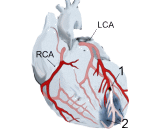Myocardial Infarction (MI)
AMI; Acute myocardial infarction; Heart attack

Myocardial infarction (MI) occurs when blood flow stops to a part of the heart causing damage to the heart muscle. The most common symptom is chest pain or discomfort which may travel into the shoulder, arm, back, neck, or jaw. Often it is in the center or left side of the chest and lasts for more than a few minutes. The discomfort may occasionally feel like heartburn. Other symptoms may include shortness of breath, nausea, feeling faint, a cold sweat, or feeling tired.[1] About 30% of people have atypical symptoms, with women more likely than men to present atypically. Among those over 75 years old, about 5% have had an MI with little or no history of symptoms. An MI may cause heart failure, an irregular heartbeat (including serious types), cardiogenic shock, or cardiac arrest.
Organism species: Mus musculus (Mouse)
- Disease model DSI504Mu01 Mouse Model for Myocardial Infarction (MI) In Stock
- Tissue TSI504Mu01 Mouse Tissue of Myocardial Infarction (MI) In Stock
- Tissue TSI504Mu03 Mouse Tissue of Myocardial Infarction (MI) In Stock
- Tissue TSI504Mu05 Mouse Tissue of Myocardial Infarction (MI) In Stock
- Tissue TSI504Mu07 Mouse Tissue of Myocardial Infarction (MI) In Stock
- Tissue TSI504Mu09 Mouse Tissue of Myocardial Infarction (MI) In Stock
- Tissue TSI504Mu11 Mouse Tissue of Myocardial Infarction (MI) In Stock
- Tissue TSI504Mu13 Mouse Tissue of Myocardial Infarction (MI) In Stock
- Tissue TSI504Mu15 Mouse Tissue of Myocardial Infarction (MI) In Stock
- Tissue TSI504Mu21 Mouse Tissue of Myocardial Infarction (MI) In Stock
- Tissue TSI504Mu41 Mouse Tissue of Myocardial Infarction (MI) In Stock
- Customized Service n/a Serums of Myocardial Infarction (MI) (If Necessary) Serums Customized Service Offer
Organism species: Rattus norvegicus (Rat)
- Disease model DSI504Ra01 Rat Model for Myocardial Infarction (MI) In Stock
- Disease model DSI504Ra02 Rat Model for Myocardial Infarction (MI) In Stock
- Tissue TSI504Ra01 Rat Tissue of Myocardial Infarction (MI) In Stock
- Customized Service n/a Serums of Myocardial Infarction (MI) (If Necessary) Serums Customized Service Offer
Organism species: Oryctolagus cuniculus (Rabbit)
- Disease model DSI504Rb01 Rabbit Model for Myocardial Infarction (MI) In Stock
- Customized Service n/a Tissue of Myocardial Infarction (MI) (If Necessary) Tissue Customized Service Offer
- Customized Service n/a Serums of Myocardial Infarction (MI) (If Necessary) Serums Customized Service Offer
Organism species: Canis familiaris; Canine (Dog)
- Disease model DSI504Ca01 Canine Model for Myocardial Infarction (MI) In Stock
- Disease model DSI504Ca02 Canine Model for Myocardial Infarction (MI) In Stock
- Customized Service n/a Tissue of Myocardial Infarction (MI) (If Necessary) Tissue Customized Service Offer
- Customized Service n/a Serums of Myocardial Infarction (MI) (If Necessary) Serums Customized Service Offer
Organism species: Sus scrofa; Porcine (Pig)
- Customized Service n/a Model for Myocardial Infarction (MI) Disease Model Customized Service Offer
- Customized Service n/a Tissue of Myocardial Infarction (MI) (If Necessary) Tissue Customized Service Offer
- Customized Service n/a Serums of Myocardial Infarction (MI) (If Necessary) Serums Customized Service Offer


